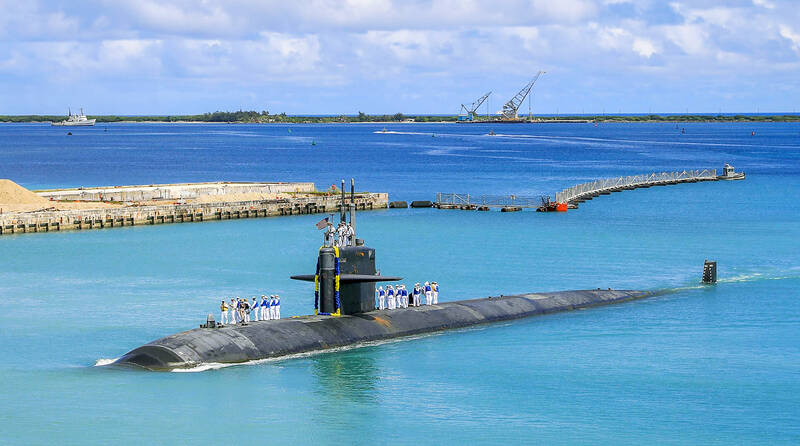An alleged campaign by Chinese state-sponsored hackers on targets in the US and Guam has raised fears that Beijing is preparing to disrupt communications in the Pacific in the event of a conflict.
The hacking campaign was first identified by Microsoft Corp on Wednesday and quickly confirmed by authorities in the US, UK and other allied nations.
Microsoft said the hacking group, which it dubbed Volt Typhoon, had breached government, communications, manufacturing and IT organizations in the US and Guam, a crucial military post in the western Pacific Ocean.

Photo: AP
While the identities of most of the hacking victims remains unknown, US Secretary of the Navy Carlos Del Toro told CNBC on Thursday that the navy was affected by the intrusions.
The extent of the breach was not immediately known, and spokesperson for the navy declined to “discuss the status of our networks.”
Rob Joyce, senior adviser for cybersecurity strategy to the director of the US National Security Agency (NSA), on Thursday told CNN that Chinese hackers could still have access to sensitive US networks that they have targeted.
Joyce said the intrusions stood out in how brazen they were in “scope and scale.”
An NSA representative declined to comment and referred instead to a release by the NSA and other US agencies on the Chinese hacking group.
Microsoft said it had “moderate confidence” that the breaches were carried out in preparation to upend communications in the event of a crisis.
The company’s disclosure came amid mounting concerns that China might take military action against Taiwan.
Former NSA director of operations Jon Darby said the operation matched a well-known method of infiltrating networks by accessing them at the edges, rather than at what he called the bull’s-eye, and then remaining undetected for years.
“The interesting thing is they got in from home routers all the way into the US Navy infrastructure,” said Darby, who is not familiar with the details of this specific case.
“The scary thing is they could then launch disruptive or destructive attacks when things are hitting the fan,” he said. “If they’re in these networks they can wreak havoc. You’ve got to identify and plug up the vulnerabilities that allowed them to get into these networks and eradicate them.”
The NSA, along with intelligence agencies from Australia, Canada, New Zealand and the UK, also shared details on the hackers. The countries are all part of the Five Eyes intelligence alliance.
“We noted this extremely unprofessional report — a patchwork with a broken chain of evidence,” Chinese Ministry of Foreign Affairs spokesperson Mao Ning (毛寧) said. “Apparently, this has been a collective disinformation campaign launched by the US through the Five Eyes to serve its geopolitical agenda.”

Conflict with Taiwan could leave China with “massive economic disruption, catastrophic military losses, significant social unrest, and devastating sanctions,” a US think tank said in a report released on Monday. The German Marshall Fund released a report titled If China Attacks Taiwan: The Consequences for China of “Minor Conflict” and “Major War” Scenarios. The report details the “massive” economic, military, social and international costs to China in the event of a minor conflict or major war with Taiwan, estimating that the Chinese People’s Liberation Army (PLA) could sustain losses of more than half of its active-duty ground forces, including 100,000 troops. Understanding Chinese

The Ministry of Foreign Affairs (MOFA) yesterday said it is closely monitoring developments in Venezuela, and would continue to cooperate with democratic allies and work together for regional and global security, stability, and prosperity. The remarks came after the US on Saturday launched a series of airstrikes in Venezuela and kidnapped Venezuelan President Nicolas Maduro, who was later flown to New York along with his wife. The pair face US charges related to drug trafficking and alleged cooperation with gangs designated as terrorist organizations. Maduro has denied the allegations. The ministry said that it is closely monitoring the political and economic situation

UNRELENTING: China attempted cyberattacks on Taiwan’s critical infrastructure 2.63 million times per day last year, up from 1.23 million in 2023, the NSB said China’s cyberarmy has long engaged in cyberattacks against Taiwan’s critical infrastructure, employing diverse and evolving tactics, the National Security Bureau (NSB) said yesterday, adding that cyberattacks on critical energy infrastructure last year increased 10-fold compared with the previous year. The NSB yesterday released a report titled Analysis on China’s Cyber Threats to Taiwan’s Critical Infrastructure in 2025, outlining the number of cyberattacks, major tactics and hacker groups. Taiwan’s national intelligence community identified a large number of cybersecurity incidents last year, the bureau said in a statement. China’s cyberarmy last year launched an average of 2.63 million intrusion attempts per day targeting Taiwan’s critical

AGING: As of last month, people aged 65 or older accounted for 20.06 percent of the total population and the number of couples who got married fell by 18,685 from 2024 Taiwan has surpassed South Korea as the country least willing to have children, with an annual crude birthrate of 4.62 per 1,000 people, Ministry of the Interior data showed yesterday. The nation was previously ranked the second-lowest country in terms of total fertility rate, or the average number of children a woman has in her lifetime. However, South Korea’s fertility rate began to recover from 2023, with total fertility rate rising from 0.72 and estimated to reach 0.82 to 0.85 by last year, and the crude birthrate projected at 6.7 per 1,000 people. Japan’s crude birthrate was projected to fall below six,